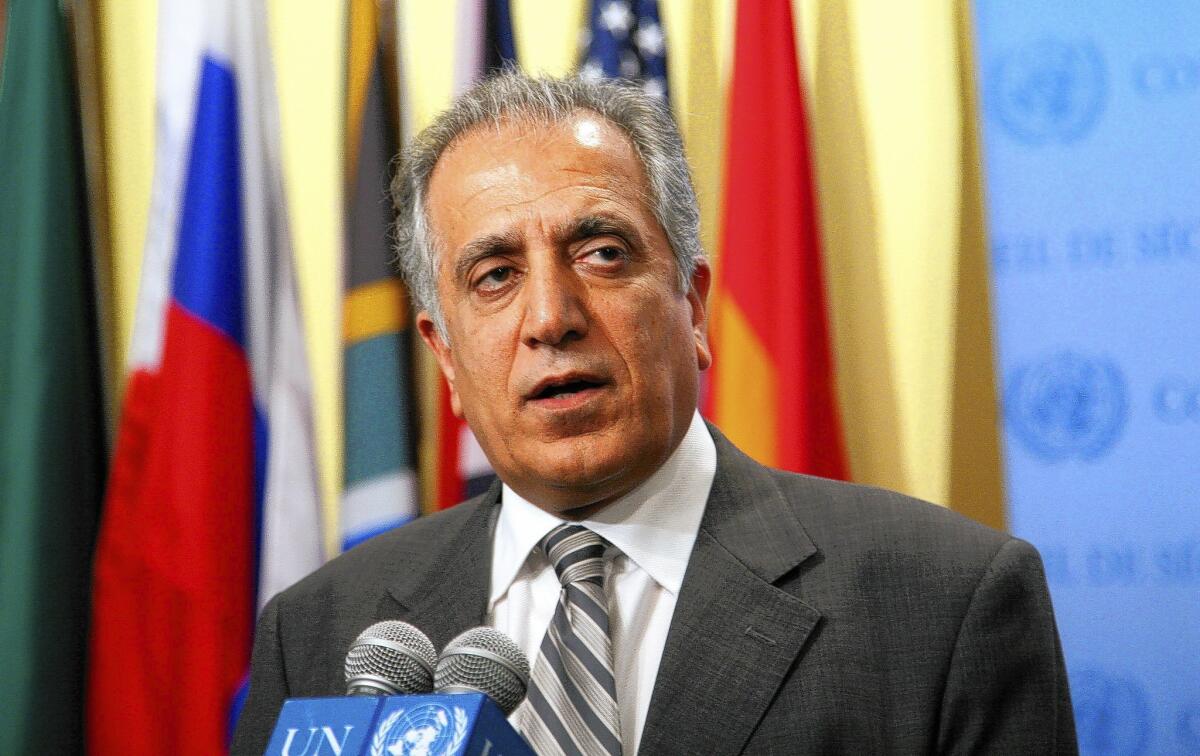Editorial: A deal with the Taliban is a painful price for ending the war in Afghanistan

- Share via
More than 18 years after President George W. Bush dispatched U.S. forces to Afghanistan to help topple the Taliban government, the U.S. and that Islamist group are on the verge of signing an agreement that the Trump administration hopes will lead to peace, the withdrawal of U.S. troops and reconciliation between Afghanistan’s political factions.
If a seven-day period of “reduced violence” that went into effect over the weekend holds, the agreement — which has been the subject of on-again, off-again negotiations — will be signed on Feb. 29, according to Secretary of State Michael R. Pompeo.
It’s possible to welcome this impending agreement — and we do welcome it — and still harbor doubts about whether all of the pieces will fall into place.
Will a deal between the U.S. and the Taliban be quickly followed by substantive negotiations between the Taliban and the government in Kabul, as the Trump administration anticipates? That is far from certain, given divisions within the current Afghan political system. Both President Ashraf Ghani and Abdullah Abdullah, who served as chief executive in a unity government, have claimed victory in a presidential election that was held in September.
Los Angeles Times editorial board endorsements for the U.S. House, California ballot measures and more.
Can the Taliban be trusted to honor a pledge that, if it regains a measure of power, it won’t provide a haven for Al Qaeda, Islamic State and other transnational terrorist groups? (It was because the Taliban government provided a haven for Al Qaeda that the U.S. attacked Afghanistan after the Sept. 11 attacks.)
Finally, will the departure of U.S. forces and a possible return to power of the Taliban erase the gains for women and girls achieved since the overthrow of the Taliban government? Sirajuddin Haqqani, the Taliban’s deputy leader, has promised that, left to their own devices, Afghans would create a political system that would protect “the rights of women that are granted by Islam — from the right to education to the right to work.” But given the oppression of women under Taliban rule, deep skepticism is warranted.
Yet even given these pitfalls, the Trump administration was right to open negotiations with the Taliban and to announce that it would reduce the number of U.S. forces in that country, which now number 12,000 (compared to 100,000 at the height of U.S. involvement). The troops now deployed advise local troops and conduct counter-terrorism operations, but they remain in harm’s way.
Like President Obama before him, Trump has been torn between a natural aversion to protracted military engagements — what Trump (and others) call “forever wars” — and pleas by military advisors that the U.S. not forfeit the political and military gains it has achieved in an operation in which more than 2,000 Americans have died.
In 2017 Trump said in an address to the nation that he had reconsidered his original intention to pull U.S. forces out of Afghanistan and suggested that a political settlement involving the Taliban was only a remote possibility, conceivable only after an “effective military effort.” But later, despite no significant improvement in the security situation, he approved talks with the Taliban.
Those negotiations were stalled after Trump overreached and proposed a premature meeting with Taliban negotiators at Camp David last year — a characteristically grandiose gesture that alarmed his national security advisors. Trump abruptly canceled the meeting, citing a bombing in Kabul that killed 12 people, including a U.S. service member, and later declared the talks “dead.”
But the negotiations led by longtime U.S. diplomat Zalmay Khalilzad resumed, and rightly so. It doesn’t demean the sacrifice of U.S. troops to recognize that in almost two decades, the U.S. has not achieved the ambitious goals of defeating the Taliban or of ending endemic corruption in Afghanistan. It makes sense to return the focus to the original justification for military action: preventing Afghanistan from again becoming a staging ground for attacks on the U.S.
The U.S. isn’t expected to agree to an immediate withdrawal of all U.S. forces; the withdrawal would be gradual. (Last year Trump indicated that he was inclined to reduce the number of troops to 8,600, perhaps even in the absence of an agreement with the Taliban.)
Phasing out the departure of the remaining troops could provide a measure of leverage for the U.S. over political developments in Afghanistan. But at some point the troops must come home, save perhaps for a small number of intelligence and counter-terrorism personnel. Afghanistan has been America’s longest war and among its least conclusive. It needs to be brought to a close.
More to Read
A cure for the common opinion
Get thought-provoking perspectives with our weekly newsletter.
You may occasionally receive promotional content from the Los Angeles Times.











